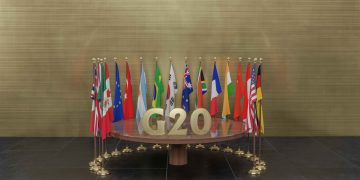The expansion of the BRICS alliance presents substantial opportunities for trade and investment across Africa, according to Prof. Vincent O. Nmehielle, Secretary General of the African Development Bank (AfDB). Speaking at a BRICS Business Breakfast during the AfDB’s 2024 Annual Meetings in Nairobi on May 27, Nmehielle highlighted the significant potential for growth as new African members join the BRICS group.
Nmehielle emphasized that BRICS, now including Egypt, Ethiopia, Iran, and Argentina under its BRICS Plus expansion, strengthens economic ties with Africa. “These nations represent emerging economies with expanding middle classes and consumer markets, providing immense growth opportunities for Africa,” Nmehielle said.
The breakfast event, hosted by the South African Chapter of the BRICS Business Council and Brand South Africa, attracted policymakers and business leaders who discussed strategies to maximize trade and investment prospects between BRICS nations and African economies. A particular focus was on the African Continental Free Trade Area (AfCFTA) and how it can drive economic cooperation and development.
Busi Mabuza, Chairperson of the South African BRICS Business Council, emphasized the importance of the BRICS Plus platform for Africa’s growth. “The BRICS Plus economies, with growing consumer markets, are ripe for African businesses to expand into,” she noted.
Discussions during the event revolved around key areas such as overcoming trade barriers, enhancing exports, and creating partnerships for sustainable development. Participants also explored South Africa’s ambitious investment strategy, which focuses on areas such as green hydrogen, digital services, special economic zones, and ESG impact investments.
Mpumi Mabuza, acting Chief Marketing Officer for Brand South Africa, presented details about the country’s green economy, which has attracted $27 billion in foreign direct investment (FDI) and generated 15,000 jobs. She highlighted the need to expand these efforts across the continent, while Nmehielle called for improved bilateral agreements to address trade deficits.
The BRICS expansion is also seen as a strategic partner for addressing Africa’s annual infrastructure investment gap, which is estimated to be between $70 and $100 billion. Nmehielle emphasized the importance of collaboration between the New Development Bank, the AfDB, and other international organizations to co-finance large-scale projects that will benefit both African and BRICS countries.
Looking ahead, Nmehielle stressed the need for Africa to collaborate with BRICS Plus on achieving a fair and just energy transition. He highlighted the role of South Africa’s 2023 BRICS chairmanship, which focused on sustainable development and inclusive multilateralism, as a key step toward strengthening ties between BRICS nations and African countries.
The African Development Bank’s 2024 Annual Meetings, running from May 27 to 31 in Nairobi, provide an important platform for exploring new avenues of cooperation between BRICS and African nations, aiming to foster transformative investment in sectors like infrastructure, energy, and digital connectivity.





















